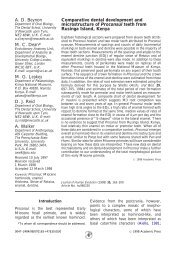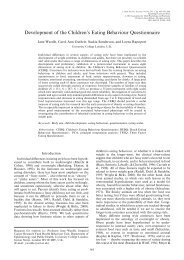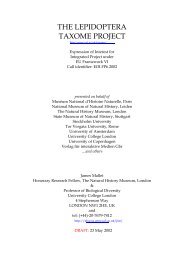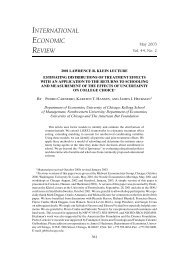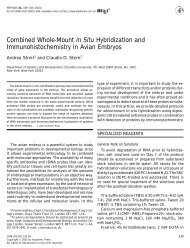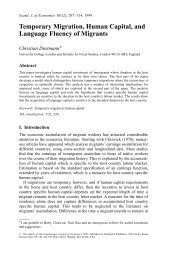The Ambitions of Contract as Promise Thirty Years On ... - UCL
The Ambitions of Contract as Promise Thirty Years On ... - UCL
The Ambitions of Contract as Promise Thirty Years On ... - UCL
You also want an ePaper? Increase the reach of your titles
YUMPU automatically turns print PDFs into web optimized ePapers that Google loves.
<strong>Ambitions</strong> <strong>of</strong> <strong>Contract</strong> As <strong>Promise</strong> 24 August 2012 discussion draft: do not quote or reproduce without permission<br />
free-market principles and analyses. Today, and for some decades, the main<br />
competitor to the promise principle h<strong>as</strong> been the economic analysis <strong>of</strong> law.<br />
Schwartz and Scott state “that the law should pursue the first order goal <strong>of</strong><br />
maximizing contractual surplus when it chooses rules to regulate merchant-to-<br />
merchant contracts.” 78 By limiting their <strong>as</strong>sertions to this context they put to one<br />
side arguments that the law <strong>of</strong> contract might be used to accomplish<br />
redistributional goals, 79 or that informational defects or severe disparities <strong>of</strong><br />
resources orrational ability to calculate advantage might justify paternalistic<br />
intervention. Other law-and-economics scholars have been willing to generalize<br />
much further. 80 I have already argued that the considerable overlap between<br />
contract <strong>as</strong> promise and the economic analysis <strong>of</strong> contract is partly explained by<br />
the fact that both are concerned with f<strong>as</strong>hioning rules and thus with the ex ante<br />
perspective <strong>of</strong> the parties. 81 Of these two theoretical accounts contract <strong>as</strong><br />
promise, by re<strong>as</strong>on <strong>of</strong> its more familiar language and concepts, enjoys a certain<br />
advantage. But the economic might respond that, even if the vocabulary and<br />
78 Schwartz & Scott, Redux, supra note 50, at 928.<br />
79 See, e.g., Duncan Kennedy, Distributive and Paternalist Motives in <strong>Contract</strong> and Tort Law, with Special<br />
Reference to Compulsory Terms and Unequal Bargaining Power, 41 MD. L. REV. 563 (1982); Anthony T.<br />
Kronman, <strong>Contract</strong> Law and Distributive Justice, 89 YALE L.J. 472 (1980); but see Louis Kaplow & Steven<br />
Shavell, Why the Legal System is Less Efficient than the Income Tax in Redistributing Income, 23 J. LEGAL STUD.<br />
667 (1994).<br />
80 See Cr<strong>as</strong>well, supra note 17.<br />
81 See supra notes 25–27 and accompanying text.<br />
44




